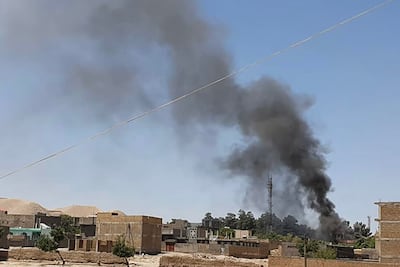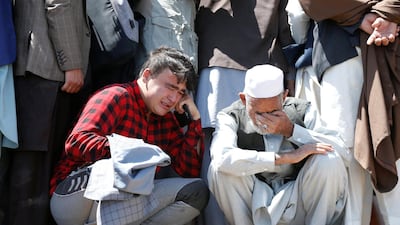The main aim of most involved in Afghanistan’s most recent conflict was always peace. Afghans wanted it; so, too, the American, British, Turkish and other international forces who raced to the country following Al Qaeda’s 9/11 attacks, planned from bases in a semi-lawless land.
The problem, which quickly became obvious, was that their ideas of peace did not align.
Most Afghans wanted the Taliban gone and the country’s warlords disarmed. Afghan militias had feuded among themselves for years, destroying swathes of cities before coalescing against the Taliban.
Americans wanted the Taliban gone and Al Qaeda, whom the fundamentalists had harboured, destroyed.
The late Donald Rumsfeld, then US secretary of defence, became the arbiter of what sort of peace could be had. He chose an America-centric version, effectively "invasion lite", to get what the US wanted done fast, and get out quickly.
What was not known at that moment was that Rumsfeld would soon have other plans for US forces: a new invasion of Iraq and the removal of America’s nemesis there, Saddam Hussein. Years later, those plans have cost America, its allies and the region dearly.
Today, the Taliban is reaping the rewards of this and a multitude of US missteps. In recent weeks its whirlwind offensive in the north of Afghanistan has seen it take district centre after district centre, and even several border crossings into neighbouring Tajikistan.
Its immediate aim is to encircle provincial capitals, laying siege to the nation by cutting highways, strangling the economy and stifling resistance to Taliban rule. The UN’s special representative to Afghanistan says the strategy is on track and concerning.

The Taliban claims to have taken more than 140 district centres and says that tally grows each day. While both the US military and Afghan officials refute these high claims, both concede that many towns have fallen, and fear that worse is to come. The deeply worrying trend indicates that the morale of Afghan forces is collapsing.
Coupled with these territorial gains, Taliban propaganda videos show the country’s former rulers rolling up to military base after military base, accumulating huge stocks of captured arms and ammunition, as well as US-made armoured Humvees. Afghan army soldiers are depicted handing over weapons and being allowed to walk free.
A well-informed diplomat says the Taliban is even finger-printing the soldiers. They are then given 5,000 afghanis ($62) and told to go home, but with a warning: if they re-join the army and are caught, they risk death. Taliban videos show soldiers receiving the financial handouts.
The diplomat believes Afghan forces had become dependent on US and Nato airstrikes to hold the Taliban back. Now those forces are leaving, the soldiers need to regain the initiative and learn to fight without relying so heavily on air support. It isn’t clear that they can.
Right now, the rout has echoes of another US military withdrawal: Vietnam. Whether it will follow the same contours as that conflict is not yet certain, but a collapse of the Afghan government is not off the cards.
Several Afghan officials say that it is not Taliban pressure that will strip the government of its standing, but its multiple infighting factions.
The US and Nato were not just the military glue holding the country together, but the diplomatic binder too. The US watched over several flawed elections that saw fraud on a near-industrial scale. In some districts, more ballots were counted than actual voters. It was the US that helped hold such frayed pieces together.
Dr Abdullah Abdullah, a candidate for the presidency, was convinced to be a sort of sub-parallel president, a so-called chief executive to Ashraf Ghani’s leadership, despite his deep misgivings about widespread voting irregularities. He set aside his own presidential aspirations to avert conflict.
Today, democracy’s guiding hand doesn’t carry the heft it once did in Afghanistan. Power in the nation has always sprung from those who could enforce their writ, and the US has ceded that role.
Ethnic as well as religious and political divisions also risk pulling the current government apart. Former warlords, grown rich courtesy of the billions of dollars that have flowed through the country, are digging into their pockets to form new militias and attempt to hold off the Taliban.
Afghan militias have always been well-armed, but the surge in such civilian forces cuts into the basic law the government had managed to establish – that only the government can tell one citizen when to kill another. With such constraints melting away, warlords and local chiefs are now free to fight local vendettas.
Afghanistan is standing on the edge of an abyss. The gravitational pull of multiple grievances is easily exploited and may draw the country inexorably towards another bloody disaster.
Of course, Afghans know themselves better than any invading force. Many of them saw all of this coming when US troops arrived in 2001; that’s why many wanted Rumsfeld to disarm the warlords and stop history repeating itself at some later date. Instead, he did the opposite.
Rumsfeld’s vision was to use minimal US military personnel and partner with local actors – that is, the warlords. Rather than neuter them and take their weapons, he armed them further.
Over the past two decades, a generation of US diplomats and generals has struggled to put the warlord genie back in its bottle, a task hindered further by Rumsfeld’s decision to go to war in Iraq.
The Taliban had been chased from power, many putting their guns down and going home to their villages to lie low. But their dream of an ultra-conservative Islamic Emirate of Afghanistan was merely put on hold.
By the time Nato and US forces began to emerge from the intense first few years of the Iraq war, they had inadvertently fuelled anti-American, ultra-Islamist forces in Afghanistan. The Taliban was re-emerging.
The newly minted tarmac motorway linking Kabul to Kandahar in the Taliban heartland, cutting a bone-crunching journey of 14 hours to five, became a perilous gauntlet run, as the first showings of the group’s resurgence emerged.
In the early 2000s, Nato ambassadors toured Afghanistan with a view to deploying more troops, but their defence ministers didn’t understand the stakes. The former UK prime minister Tony Blair’s secretary of defence, John Reid, rather optimistically said: “We would be perfectly happy to leave in three years’ time without firing one shot.”
In the event, hundreds of brave and honourable British troops died in Afghanistan, along with thousands of Americans and tens of thousands of their Afghan colleagues. Other allied countries, from Italy to the UAE, all suffered the loss of human life there.
The Taliban has been thinking ahead for two decades. Over those years, it has extended its appeal beyond its traditional Pashtun ethnic base, recruiting Afghanistan’s Uzbeks, Tajiks and Hazaras to its ranks. In doing so, it has ensured that the Taliban will be harder to beat in the post-US round of Afghanistan’s enduring civil war.
The question in Afghan government circles is: "What happens next?" Will they and their country be ignored and forgotten by the West?
What they know is what every Afghan leader and historian knows all too well: another nation has always been ready to step into any power vacuum in this country.
Right now, China is the most likely candidate; in President Xi’s Belt and Road initiative, a peaceful Afghanistan could play a vital role. It could stabilise trade routes to the north and help link Central Asia’s vast wealth to the Indian Ocean through neighbouring Pakistan’s deep-water port, Gwadar.
In a world never more unified against what US President Joe Biden sees as an increasing threat from China, the wider question is why America should cede such a vital piece of "great game" real estate to a nation with which he is increasingly at odds.
Nic Robertson is CNN's international diplomatic editor


